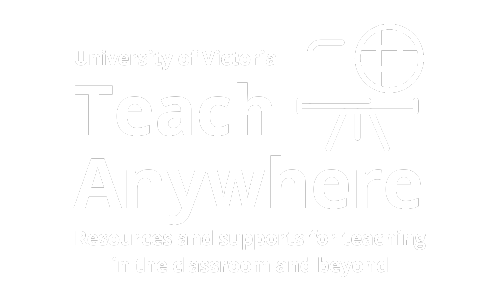About the grant
The Open Educational Resource grant supports learning and teaching projects that focus on the adoption, adaptation, or development of Open Educational Resources (OERs), with the aim of replacing existing textbooks or other types of educational resources that can be prohibitively expensive. Ideally, the completed OERs will be useable not just at UVic, but at other post-secondary institutions. OER grants are offered as a partnership between UVic Libraries and the Division of Learning and Teaching Support and Innovation (LTSI).
What is an Open Educational Resource?
OERs are freely accessible, openly-licensed documents and media that are useful for teaching, learning, and research purposes.
What is an open textbook?
Open textbooks are one type of OER. Open textbooks are licensed under an open-copyright license and made available online to be freely used by students, teachers, and members of the public. Print-on-demand copies can also be made available at cost through the University Bookstore.
Request a consultation
Timeline
Application Guidelines
Materials and submission form available by December 1, 2024.
Grant Deadline
Each grant will be due by 11:59pm, February 24, 2025.
Adjudication Process
Grant committees will meet in the following 30-60 days.
Applicants Notified
Applicants will be notified Spring 2025.
Open Educations Resource Grant
Application details
Eligibility
All LTSI grants are open to:
Single or co-applicants who directly support student learning and the student experience at UVic are eligible to apply for LTSI grants including:
- research stream faculty
- teaching stream faculty
- sessional lecturers
- laboratory instructors
- academic units
- staff
Previous LTSI grant recipients may apply. If your grant is still active, you must close it out before applying for a subsequent LTSI grant. You may not apply to more than one LTSI grant in the same year.
Grant criteria
Successful proposals will include a:
- clear specific statement of what the applicant would like to achieve (which could include adopting, adapting or developing OERS);
- well-articulated plan for how to proceed and principles that will guide the process;
- description of the proposed significance of the project in terms of contributions to teaching and student learning and that demonstrate potential for significant large-scale or long-term impact;
- brief, targeted review of the literature that supports the plan;
- plan for sharing the project goals and outcomes to appropriate audiences;
- sustainable budget with justification for each item; and,
- any additional supports from LTSI or other campus partners that might be helpful for your project.
Please note: You cannot apply to more than one LTSI grant in the same year for the same project.
Submit your grant application
Complete your grant application using Survey Monkey. The platform enables you to save your materials midway, so no need to complete the application in one sitting.
Adjudicator's rubric
Adjudicators will use a scoring rubric to assess your proposal, with rating scores ranging from 1.0 to 5.0.
Ready to submit your application?
The link to the application form will go live on December 1, 2024.
Past recipients
2023-2024
- Anthony Estey, Department of Computer Science
Teaching Quantum Computing to a Diverse Audience Through Interactive Visualization Tool ($6,464) - Violeta Iosub, Department of Chemistry
Developing an interactive website with spectroscopy problems for organic chemistry courses ($7,475)
2022-2023
- Trefor Bazett, Department of Mathematics and Statistics
Adopting the WeBWork Open Homework System in the Calculus Sequence ($7,500 BC Campus Funding) - Dennine Dudley, Department of Art History and Visual Studies
Learning to Look: Explorations in Visual Literacy ($4,850 BC Campus Funding) - Sara Humphreys, Academic and Technical Writing Program (ATWP)
“It’s the End of the World as We Know It”: Generative AI and Academic Writing ($3,300 BC Campus Funding) - David Leach, Department of Writing
The Climate Disaster Project: Open Source Trauma-Informed Storytelling and Climate Journalism ($7,500) - Matthew Pollard, Department of Germanic and Slavic Studies
Fostering Diversity and Inclusion in the Language Classroom: Creating OER materials and adopting OER content for First-Year German ($7,500 BC Campus and OER Grant Funding)
2021-2022
- Ilamparithi Thirumarai Chelvan, Department of Electrical and Computer Engineering
Creating an open textbook for ECE365 (Applied Electronics and Electrical Machines) course ($7,500) - Gerry Ferguson, Faculty of Law
Global Corruption: Law, Theory and Practice ($7,500) - Sara Humphreys, Academic and Technical Writing Program (ATWP)
The Why Write Project: An Anti-Racist Writing Guide for Instructors and Students at the University of Victoria ($7,500) - Valerie Irvine, Department of Curriculum and Instruction and Educational Technology
Internet Radio for Open Community Engagement ($7,500) - Alexandra (Sasha) Kovacs, Department of Theatre
Theatre Artist Interview and Reflection Podcast: Theatre History IV Companion Podcast ($7,297) - Adam Krawitz, Department of Psychology
decidables: Explorable Explanations of Decision Making ($3,531) - Michael Paskevicius, Department of Curriculum and Instruction
UVic Open Hub Community Development ($7,500 BC Campus Funding) - Lijun Zhang, Department of Economics
Adaptation of OpenStax Textbook in Econ 104: Canadian Contents ($7,477)
2020-2021
- Sara Humphreys, Department of English, Academic and Technical Writing Program
Why Write?: A Guide for Advanced Student Researchers in Canada ($7,257)
